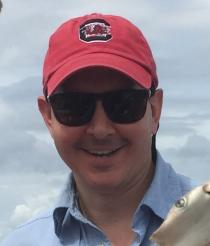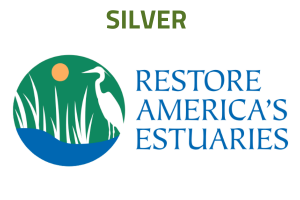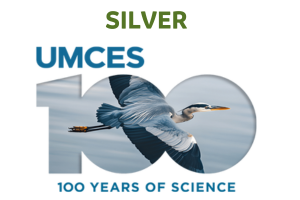- About
- Program
- Registration
- Experience
- Student & EC
- Hotel/Travel
- Sponsor/Exhibit
- Resources & More
CERF 2021 Workshop
|
||||||||||||||||||||||||||||||||
| Matthew E. Kimball, PhD | |
|
|
Baruch Marine Field Laboratory, University of South Carolina Matt Kimball is the Assistant Director of the University of South Carolina's Baruch Marine Field Laboratory located at the edge of the North Inlet estuary in Georgetown, SC. Originally from North Carolina, he received his BS in Biology from the University of North Carolina at Chapel Hill, MS in Zoology from North Carolina State University, and PhD in Ecology and Evolution from Rutgers University. Matt's research interests and activities focus on understanding early life stage (larvae and juvenile) fish community diversity, abundance, and distribution in coastal and estuarine habitats so that we can better conserve, manage, and restore these important ecosystems. He is especially interested in the influence of biological and physical factors on the movement and behavior of juvenile stages of estuarine fishes and invertebrates, as well as the effects of habitat on the survival and growth of these organisms. For the past 20 years, Matt has pursued these research topics through a combination of field and laboratory approaches targeting species and habitats that occur in coastal and estuarine ecosystems throughout the US Atlantic and Gulf coasts. |
| Sean P. Powers, PhD | |
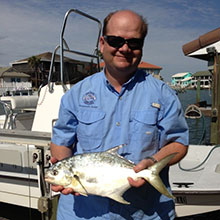 |
Professor and Director, School of Marine and Environmental Sciences, University of South Alabama and Senior Marine Scientist at the Dauphin Island Sea Lab Dr. Sean Powers currently serves as Director and Stokes Endowed Professor of the newly created School of Marine and Environmental Sciences at the University of South Alabama and is a Senior Marine Scientist at the Dauphin Island Sea Lab. Dr. Powers research lab, personnel and graduate student are located both on the USA main campus as well as the Shelby Center for Ecosystem Based Fisheries Management at the Dauphin Island Sea Lab. Dr. Powers grew up in New Orleans and received his Bachelors of Science at Loyola University and a Master of Science degree from the University of New Orleans. He received his Ph.D. in biology and oceanography from Texas A&M University in 1997. Following his Ph.D., Dr. Powers received a National Sea Grant John Knauss Marine Policy Fellowship in Washington D.C. Dr. where he worked at the National Science Foundation’s Ocean’s Sciences Division. After completing an additional year of service at the National Science Foundation, Dr. Powers completed post-doctoral training at the University of North Carolina at Chapel Hill. He joined the faculty at the University of South Alabama in 2003. Dr. Power’s research focuses on conservation and restoration of marine fish and invertebrates, particularly those that support commercial and recreational fisheries. The ultimate goal of his research program is to provide scientifically sound information to direct conservation and restoration efforts of marine fisheries and habitats. He has published nearly 150 peer-reviewed scientific articles, many in leading journals in the field; served as PI of Co-PI on over 30 million dollars in extramural grant funding; advised 18 graduate students (10 PhD. and 9 MS); and engaged a variety of groups including national non-governmental organization (NGOs), regional conservation and sportsman groups to develop sustainable management practices for marine resources. Dr. Powers was named one of the 50 Most Outstanding Faculty in the University’s 50 year history and has received several University awards for his research. Dr. Powers has served on four National Academy of Sciences Study Committees, supported NOAA’s Natural Resources Damage Assessment and Restoration for several cases, served as a scientific advisor for NMFS and regional fisheries management councils, and advises serval Gulf States on fisheries management and habitat conservation/restoration activities. |
| Ian C. Zink, PhD | |
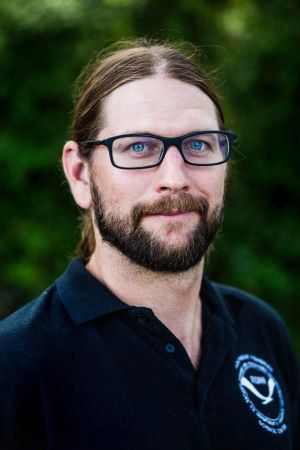 |
NOAA Fisheries Office of Habitat Conservation Restoration Center Ian C. Zink recently joined the Restoration Center’s Deepwater Horizon Restoration Program where he assists with monitoring and adaptive management associated with implementing restoration activities. He holds a PhD from the University of Miami Rosenstiel School of Marine and Atmospheric Science; these studies focused on habitat associations and impacts of Comprehensive Everglades Restoration Plan implementation on nearshore pink shrimp productivity. Ian also holds MSc and BSc from the University of Miami, which focused on marine aquaculture and general marine biological and chemistry studies, respectively. Prior professional experience includes marine and freshwater aquaculture, ichthyoplankton sampling and sample processing, manipulative field and laboratory experiments, habitat restoration monitoring, and computer simulation. Ian’s professional interest centers around fish and invertebrate productivity impacts and benefits associated with habitat restoration. |
| Katherine M. Hornick, PhD | |
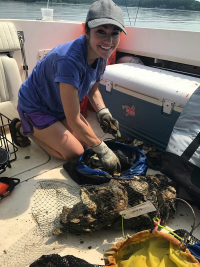 |
Marine Habitat Resource Specialist with Earth Resources Technology, Inc supporting NOAA Office of Habitat Conservation Restoration Center Katie Hornick is a Marine Habitat Resource Specialist with Earth Resources Technology, Inc supporting the NOAA Office of Habitat Conservation Restoration Center. She provides support for monitoring and adaptive management approaches for restoration planning and implementation, and a large portion of her work has focused on assessing habitat services to fishes and invertebrates from restoration activities. In 2020, Katie received a John A. Knauss Marine Policy Fellowship where she supported this work in the Restoration Center. She holds a Ph.D. from the University of Maryland, College Park in Marine, Estuarine, and Environmental Science. Specifically, Katie’s dissertation focused on characterizing the genetic impact of large-scale hatchery-based oyster restoration in the Chesapeake Bay using a combination of experimental, field, and modeling approaches. While she has expertise in oyster genomics and modeling, she is interested in the broader applications in science-based restoration and conservation. |
| Jennifer Hart, MS | |
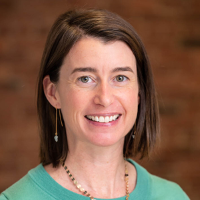 |
Senior Technical Consultant, Industrial Economics, Inc. Jennifer Hart is a Senior Technical Consultant at Industrial Economics, Incorporated (IEc), specializing in natural resource injury assessment, remediation, and restoration. Jennifer holds a Master of Science in Marine Biology from the University of North Carolina at Wilmington. Her background is in seagrass physiological ecology, and she has conducted seagrass monitoring and restoration throughout the Southeast Atlantic, including Florida and the Caribbean, the Gulf of Mexico, and the Pacific. More recently, Jennifer’s work has included oversight of long-term environmental monitoring programs and restoration planning. |
| Melissa V. Carle, PhD | |
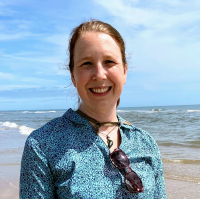 |
Monitoring and Adaptive Management Team Lead for NOAA’s Deepwater Horizon Restoration Program, NOAA Fisheries Office of Habitat Conservation Melissa V. Carle works for the NOAA Fisheries Office of Habitat Conservation, where she serves as the Monitoring and Adaptive Management Team Lead for NOAA’s Deepwater Horizon Restoration Program. Melissa received her PhD from Louisiana State University and her Masters of Environmental Management from Duke University. Her work has focused on the intersection between marine and coastal ecology, restoration ecology, and spatial ecology. She is particularly interested in applying science to assess the outcomes of restoration and management actions across multiple spatial and temporal scales. She also focuses on the ecological functions of restored habitats and better understanding the trajectories of restored sites in comparison to natural habitats. Since she joined NOAA in 2014, Melissa has been focused on developing and implementing a comprehensive monitoring and evaluation framework for ecosystem restoration in the Gulf of Mexico. |

